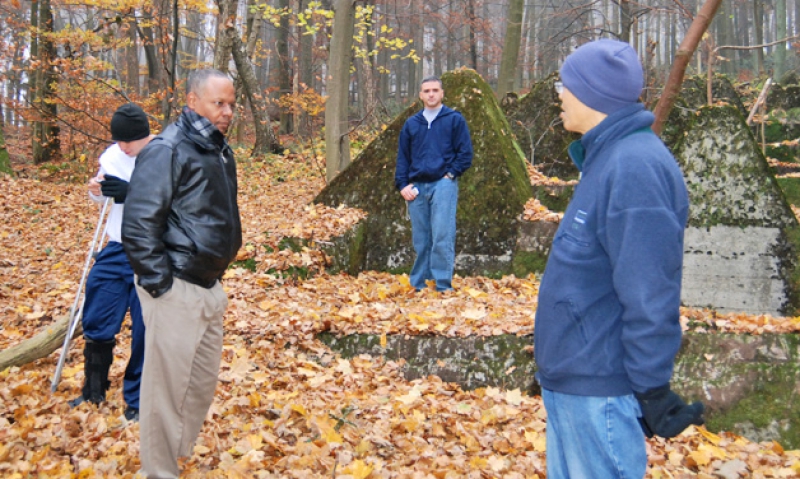
Through Operation Comfort Warriors, Legion-sponsored retreats allow warriors recovering at Landstuhl Regional Medical Center to decompress.
Many came from “downrange,” a catch-all term for Afghanistan and Iraq. Others were recovering from injuries or illnesses incurred outside the war zones, but still worthy of medical attention. For at least one day, the recent trip to the infamous Berwartstein “Boogeyman” Castle in Germany’s Palatinate Forest was designed to help a dozen American heroes forget the horrors of war or pressures of being a deployed U.S. servicemember.
Funded in part by The American Legion’s Operation Comfort Warriors program (www.legion.org/troops/operationcomfort), the cultural “retreats” are a frequent occurrence organized by the Landstuhl Regional Medical Center’s Pastoral Division.
“These trips help people regain their situational awareness,” explained Chaplain Manuel Mak, a Navy commander. “They may be here physically, but emotionally many are still downrange. Trips to some of these cultural and historical sites provide the opportunity for servicemembers to de-stress before reaching a crisis point.”
The Berwartsein Castle is a medieval fortress dating back to the 12th century. Used as base by robber barons named von Berwarstein, legend has it that terrified villagers referred to the head of the crooked clan as the “Boogeyman.” It is only one of many destinations that Landstuhl chaplains use to help outpatients – and a few inpatients – escape the confines of the hospital grounds or nearby wounded warrior barracks.
“By talking to chaplains or behavioral health specialists, it gives them a chance to defuse,” said Maj. David Kirk, a U.S. Army chaplain. “They are out of the theater of war. They are in a safe place here with us. These trips offer them an opportunity to talk to a chaplain or each other. Some reconnect with their religion, even though we don’t ever force it on them. They visit places like the Rhine River, castles and caves. You can see the change in them as they go from being really tight and tense in the morning to being more relaxed in the afternoons. It’s very encouraging.”
Some of the destinations are used to demonstrate a life lesson, as Mak highlighted during a stop to a field of intimidating steel anti-tank barriers built by the Germans during World War II near the Maginot Line. “These tank traps are also known as ‘dragon’s teeth,” Mak told the wounded warriors. “They were supposed to stop these iron behemoths from crossing the line. But the allied tanks overcame them fairly easily. Do you know how? They simply put dirt on top and rolled over them. Now think about the obstacles that you have had to face and ways that you can overcome and adapt.”
Most patients treated at the LRMC are transferred back to their original units, stateside medical facilities or home within two weeks of their arrival. Because of the brevity of their stay, most of the wounded warriors are only recent acquaintances that have had little time to bond with each other. Yet after a day of exploring castles and countryside, the chatter among comrades increased noticeably as stories from Afghanistan, Iraq and other military spots dominated the discussion on the ride home.
“I never trusted those TCNs (third country nationals) driving those buses in Afghanistan,” said one vet, making reference to the clear threat posed by suicide bombers.
“I walked a lot,” a Marine from downrange quickly agreed.
A little weary by the end of the day, the servicemembers of Landstuhl’s Medical Transcient Detachment offered positive reviews of their adventure.
“I was little skeptical about getting up and coming this morning,” said Staff Sergeant Ken Wood, an Army Reservist from Quincy, Mass. “But even though I was on the fence about going, I had a great time. It was good talking to the other soldiers on the trip and on the ride home. The chaplain’s office takes really good care of us and this trip was definitely worthwhile.”
Wood was being treated for blood clots that he believes could be the result of deep vein thrombosis, possibly incurred from bouncing around in convoys while in Afghanistan. Like most at Landstuhl, he is anxious to return to his unit and from there, to his hometown where he is employed as a police officer.
“We had my going-away party at my American Legion post, Post 382,” he said. “My father has been a member and I never looked back from joining. They have been extremely supportive of my family – my wife and three kids.”
- Troops

